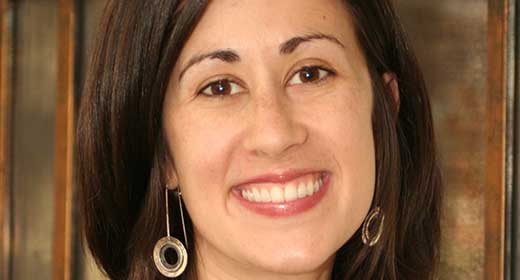
Lelia Gowland (MPP '11) has New Orleans' back. Born and raised in the city, she left her hometown to attend college and always planned to return. Little surprise that she has spent the last few years doing social justice advocacy for youth in the criminal justice system—work that ultimately helps buttress New Orleans' communities.
Lelia's passion for criminal justice policy increased after taking David Thacher's course "Thinking about Crime" at the Ford School. In the course, Lelia says, "We talked about decarceration and its implications, and looked at every facet of criminal justice reform. The course was exciting for me."
But now that she had the "what" (criminal justice policy) and the "where" (NOLA), Lelia needed the "how"—how and in what sector would she perform the work that had become so important to her? A key moment arrived when she attended a talk by Jennifer Cruickshank (MPP '08), a Ford School alumna and director of state relations for Mayor Thomas Menino of Boston. Jennifer described the joy of working in local government, which encouraged Lelia to apply for a summer internship in Menino's office.
"She told us that you get to see the fruits of your labor and the impact you're having on your community first hand. The idea to work on criminal justice reform in local government came from that talk," Lelia explains.
First stop after the Ford School: the Department of Human Services as a policy advisor overseeing New Orleans' juvenile detention center. Lelia was charged with managing the center's compliance with a consent decree, the result of a lawsuit brought by the Juvenile Justice Project of Louisiana (JJPL) for unconstitutional confinement conditions such as unacceptable treatment and a dearth of educational and recreational programming.
That same detention center is now receiving plaudits for what can only be described as a dramatic turnaround. The center, along with juvenile court and its programs, will be an integral part of a new juvenile justice complex.
And Lelia? After briefly leaving city government to manage Dana Kaplan's unsuccessful bid for New Orleans city council, Lelia now works as communications and development director for JJPL. "I left my job with the city because I believed completely in Dana Kaplan's vision for criminal justice reform, the city as a whole, and the progress we still need to make." She now works with Kaplan, executive director of JJPL, striving for that progress.
A nonprofit, JJPL does legal advocacy and reform work around the criminal justice system in Louisiana. It monitors conditions in juvenile detention centers to ensure that they are humane, safe, and rehabilitative—a legal requirement that is often far from conditions on the ground. "We look at criminal justice through the lens of what's best for the community, we look at the community holistically," says Lelia. "It's not about getting tough on crime, which simply isn't efficient, or effective, but about empowering young people and their families." The organization also does youth organizing and trains teachers on how to avoid the school-to-prison pipeline by examining school discipline and "the profound effect it has on the life course and short-term criminal activity," as Lelia notes.
The organization considers the effectiveness of prevention and intervention programs, in addition to ensuring youth are treated fairly and given the best opportunities to grow and thrive. And it's exactly where Lelia wants to be.
"This is the work I want to be doing—social justice advocacy in New Orleans. No matter what, I was coming home."